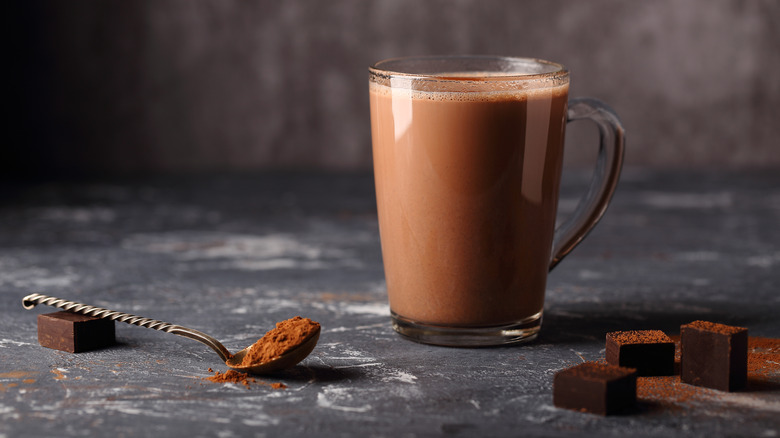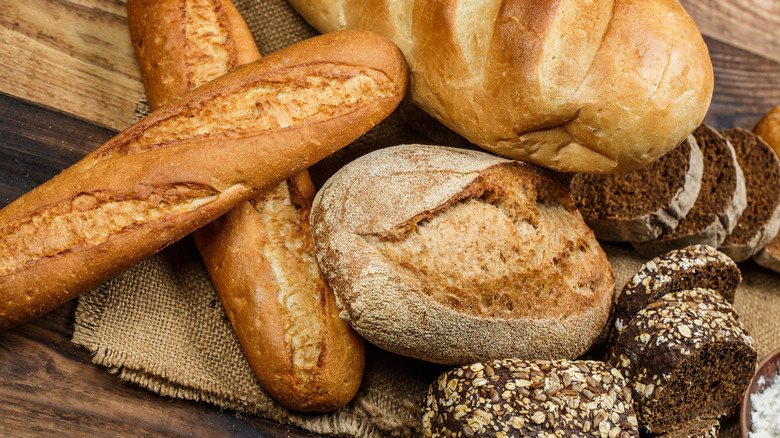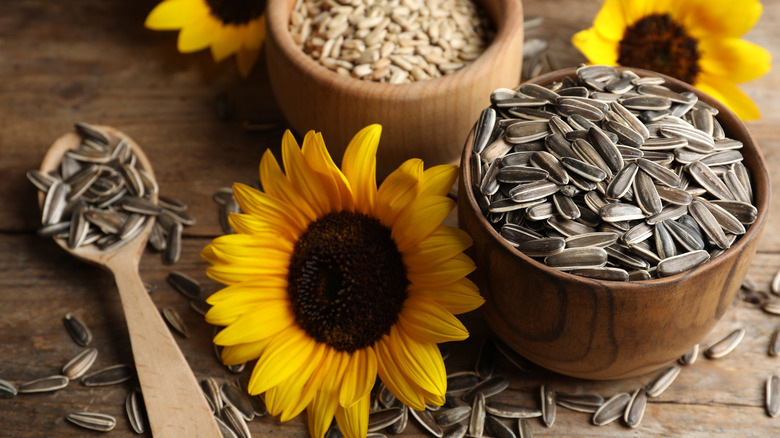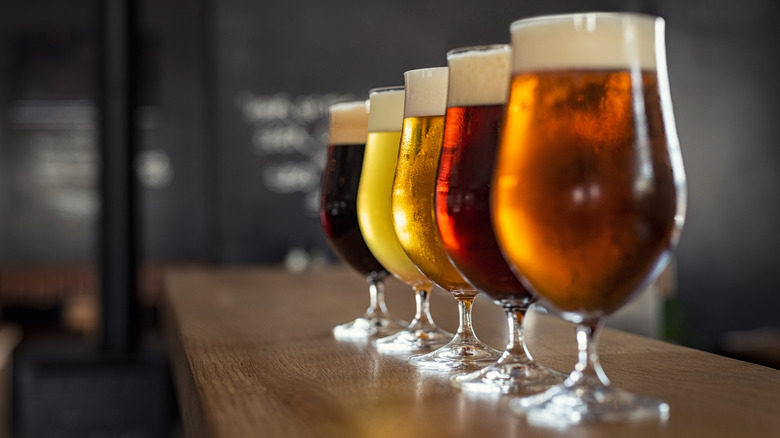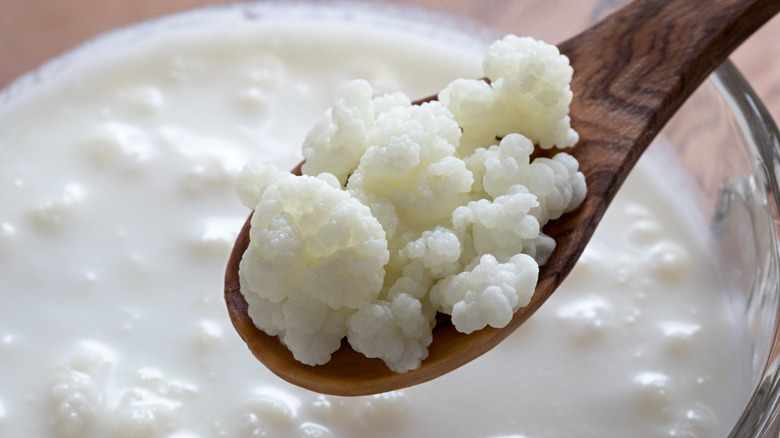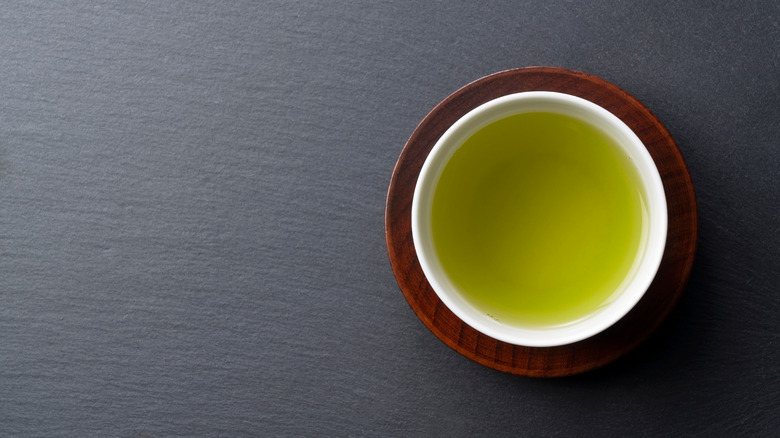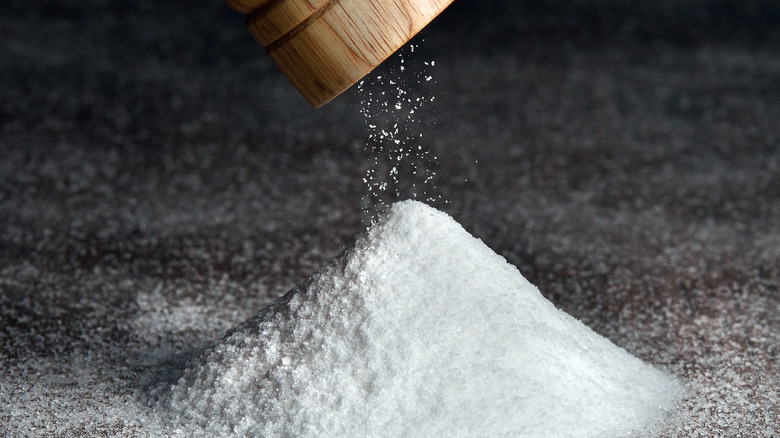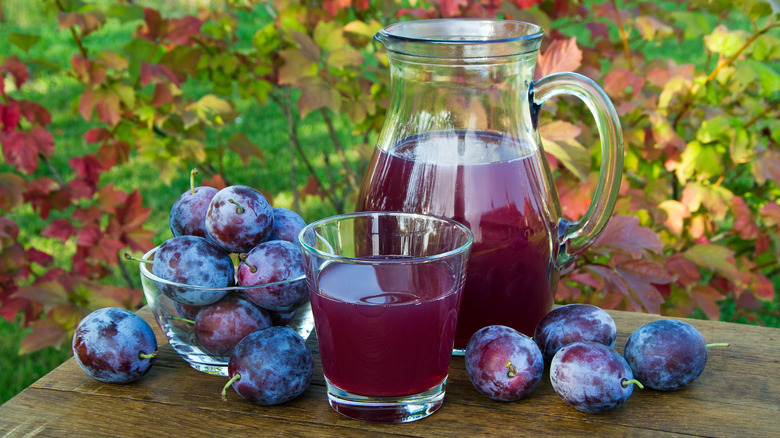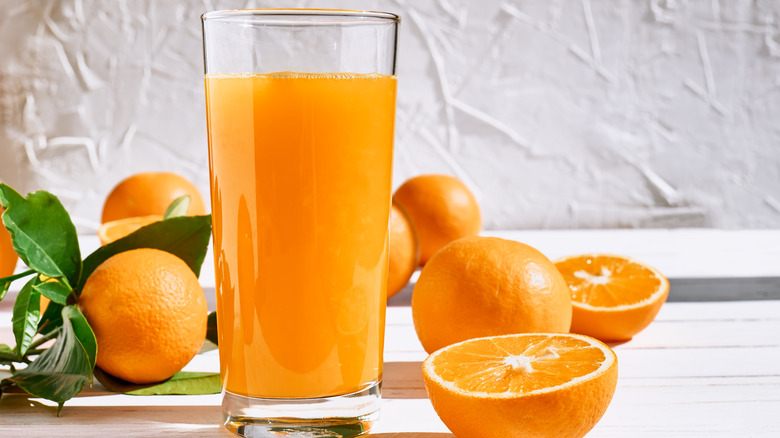7 Foods To Eat And 7 To Avoid When You Have Multiple Sclerosis
What do Christina Applegate, Selma Blair, and Montel Williams all have in common? Besides being celebrities, all three have a chronic disease known as multiple sclerosis, or MS (via Page Six and the National Multiple Sclerosis Society). While there are still aspects of MS that we don't fully understand, we believe that it involves the immune system mistakenly attacking the central nervous system (a.k.a. the brain, spinal cord, and optic nerves).
Remember, everything you do from walking to reading this article is only possible because your brain sends electrical signals to the correct parts of your body (via the National Multiple Sclerosis Society). But if your central nervous system is damaged, these signals might not properly reach, for example, your legs or your eyes. In other words, MS can interfere with everyday activities that most of us take for granted. As a result, a person with MS may experience issues with their memory, visions problems (including blindness), exhaustion, difficulty coordinating their movements and maintaining their balance, problems with focusing, and even paralysis.
With so many potentially serious symptoms, it's no wonder that someone with MS would try to manage their condition not just through medication, but also lifestyle. Unfortunately, as the National Multiple Sclerosis Society's website explains, there is no one-size-fits-all ultimate diet that is "beneficial in changing the course of MS." Nevertheless, adding or avoiding certain foods (under a healthcare professional's supervision) is a crucial part of any plan to help manage MS and maintain a better quality of life.
Have: Hot Cocoa
Often anything chocolatey winds up in the "avoid" column with these "good foods, bad foods" lists. However, one study has found evidence that hot cocoa's anti-inflammatory properties might be helpful for someone with multiple sclerosis (via WebMD). But before you run out to supermarket, there's a few important points regarding these findings. First, this was a small study involving only 40 people. Second, all the participants of this study had a specific type of multiple sclerosis known as relapsing-remitting MS where a person's symptoms come and go, and the ailment itself doesn't become worse between these reoccurring attacks (via WebMD and the National Multiple Sclerosis Society). So, more research is needed to confirm this study's data. With that said, the study did find that drinking hot cocoa reduced common MS symptoms like pain, fatigue, and difficulty walking.
So, how could a common hot beverage like cocoa be potentially so beneficial to something as complex as a human's central nervous system? Well, cocoa contains large amounts of substances called flavonoids, which are believed to reduce inflammation (via WebMD). And while this alone isn't enough to cure MS, it might be enough to mitigate some of its symptoms. But one final word of caution: Hot cocoa often contains sugar, which can be bad for someone with MS (via MS Focus Magazine). So, if you want to add this drink to your MS-friendly diet, you might want to make your own cocoa from scratch.
Avoid: Food with gluten
If you've ever been to a bakery or a supermarket and wondered why some of the items listed are followed by the letters "GF," then wonder no longer. This simply means these foods are gluten free. And if you're a little fuzzy on exactly what gluten is, it's a protein that is in products made from grains, wheat, and barley (via U.S. News and World Report). Unfortunately, some individuals have a condition called celiac disease where they cannot tolerate gluten. And research has found that if a person has multiple sclerosis, then they are more likely to also develop celiac disease.
As U.S. News and World Report explains, celiac disease is an autoimmune disorder where your immune system treats gluten the same way it would a dangerous virus or bacteria. The results are your immune system winds up damaging your small intestine, which is why eating gluten can cause digestive pain for someone with this condition. Celiac disease can also lead to symptoms like exhaustion, depression, and pain — all of which are also symptoms of MS (via U.S. News and World Report and the National Multiple Sclerosis Society). So, if you are someone with both MS and celiac disease, eating gluten-rich foods might exacerbate some of your MS symptoms (via U.S. News and World Report). However, before you remove gluten from your diet, contact your healthcare professional, especially if you think you have celiac disease.
Have: Leafy greens
If you or someone you know has multiple sclerosis (MS), then you're probably researching this condition and focusing like a laser beam on MS-related studies. However, sometimes an important finding can come from an unexpected source that on the surface seems to have nothing to do with MS. Case in point, research from Rush University that supports eating leafy greens (via Healthline).
This study explored the impact of diet on the memory and cognitive abilities of adults around the age of 81. The study concluded that the participants who regularly ate foods packed with specific nutrients did not experience the same level of cognitive decline as those who didn't make these foods a part of their diets. Keep in mind that cognitive dysfunction, or "cog fog," is a symptom of MS. And specifically, leafy greens contain vitamin E, which can help reduce oxidative stress, which is caused by irregular atoms damaging cells throughout the body and can worsen MS symptoms (via Healthline).
Besides containing vitamin E, leafy greens might help manage MS symptoms because of the impact they have on the community of microorganism (microbiome) naturally found in the digestive system. "Bringing in roughage changes the microbiome into a healthier one," notes senior dietitian Nichole M. Bednar to Healthline. Plus, Bednar says that if these microorganisms are healthy, then that reduces the chance of inflammation, which can also help with MS symptoms related to memory and thinking.
Avoid: Processed foods
If you know your way around a kitchen, then preparing something from scratch can have its benefits. For one, you know exactly what is in your meals. There's no vague food labeling language like "spices" or "other natural ingredients." And if you don't want to use something made from an unpronounceable chemical, then you can simply choose a different ingredient. But if cooking isn't your strong suit, or you have a hectic schedule, then processed foods can seem like an easy solution — but they're not always the best solution, especially if you have multiple sclerosis.
As MS Focus Magazine explains, both sugars and saturated fats can have negative impacts on someone with MS. In fact, a University of Arizona study found that consuming large amounts of sugar and saturated fats can lead to more inflammation throughout the body, which can negatively impact cognitive function. And Dr. Terry Davidson, the director of the Center for Behavior Neuroscience at American University in Washington, D.C., cautions that regularly eating at great deal of sugar and saturated fat might affect memory.
Okay, but what does this have to do with processed foods? Well, even though technically any food that's been altered during the manufacturing process could be considered a processed food (via Everyday Health), a number of these convenient meals and snacks are loaded with sugars and saturated fats (via MS Focus Magazine). So, if you or someone you know has MS, the fewer ready-made meals in your shopping cart, the better.
Have: Sunflower seeds
This next food is a little controversial, but still worth mentioning for its potential to help patients with multiple sclerosis. Some studies have found that the vitamin biotin, which is found in sunflower seeds, might help with progressive MS (via Medical News Today). As the National Multiple Sclerosis Society explains, MS can be primary progressive or secondary progressive where symptoms are no longer intermittent, leading to more constant and sometimes more problematic issues. And, according to Medical News Today, biotin (also known as vitamin H or vitamin B-7) might be helpful for some MS patients because this vitamin helps the body create myelin, the protective material around nerve cells. When MS patients' immune systems attack the nerve cells, myelin is usually damaged or destroyed, resulting in a wide range of problems that can affect the entire body.
Although some studies on the effects of biotin on MS have yielded promising results like an improvement in fatigue, pain, vision issues, and partial paralysis, others have shown either no improvement in the long run, or symptoms becoming worse (via Medical News Today). Keep in mind that some of these studies involved high doses of biotin. Nevertheless, anyone with MS should speak with their healthcare professional before adding more biotin to their diet. With that said, if your physician approves of trying biotin, sunflower seeds can be a very convenient way to test the effectiveness of this vitamin on your symptoms.
Avoid: Alcohol
It's rare that alcohol makes the "healthy drink options" list, but some patients with multiple sclerosis turn to beer, wine, or other alcoholic beverages to help manage their symptoms (via WebMD). And while some MS patients may be able to have an occasional drink, for others even a small amount of alcohol can worsen their symptoms. As Dr. Jennifer Graves, associate professor of neurosciences and director of the Neuroimmunology Research Program at the University of California San Diego explains, alcohol can be problematic for someone with MS in three ways. For one, it can interact with medications commonly used to help symptoms of MS like sleeping issues, pain, and feelings of depression. But even if someone isn't taking medications for MS, alcohol all on its own can worsen MS-related problems. "If you have a lot of trouble with balance, thinking, or memory symptoms from MS, it may be better to avoid alcohol altogether," Dr. Graves tells WebMD.
Besides its direct impact on MS, alcohol consumption can lead to other aliments like elevated cholesterol, cancers, and even strokes. And while all of these health issues are concerning on their own, they can also exacerbate MS-related problems. Plus, there's still one more point to consider: Different types of alcohol can have different affects on your body. So, even if you think your go-to beverage is a safe choice, you still might want to speak with your health care professional.
Have: Kefir
Although multiple sclerosis mainly targets the central nervous system, some evidence points to supporting good digestive health in order to manage symptoms (via Healthline and National Multiple Sclerosis Society). Specifically, eating foods that keep the microorganisms living in the gut healthy might help keep inflammation down throughout the body, and in the process keep certain MS symptoms under better control. And according to MS Focus Magazine, one way to do this is by eating fermented foods, including kefir.
As Medical News Today explains, kefir is made by combining milk (usually cow's milk) with kefir grains and storing the concoction in a warm place to ferment. The results are a thick drink similar in consistency to yogurt that is packed with probiotics. This is why drinking kefir can give your body a fresh dose of bacteria that is good for the digestive tract and might help manage MS symptoms. Plus, kefir might help with other medical issues like cholesterol and sugar levels, as well as weight management. If you do not like the taste of cow's milk, kefir is also made from sheep and goat's milk. And if you do not eat animal-based products, non-dairy milk kefir options are also available. In addition, kefir grains are gluten free, and since gluten can be an issue for someone with MS, this drink can help one get the benefits of grains without the possible complications of gluten intolerance (via U.S. News and World Report).
Avoid: Soda made with sugar
While you might have sweet childhood memories connected to this next food, if you have multiple sclerosis, you might want to consider cutting it from your diet. A study has found a possible connection between drinking large amounts of sugary soda and exacerbated symptoms of MS (via WebMD). Now to be fair, this was a small study, and it couldn't confirm a direct link between drinking soda and worsening MS symptoms. With that said, of the 135 MS patients who participated in the study, those who daily drank roughly two cans of soda made with sugar experienced disabling symptoms of MS five times more often than the other participants. In fact, these soda-drinking participants' level of disability was in the severe range.
While the study's author, Dr. Elisa Meier-Gerdingh, said additional research is needed, she still advised those with MS to consider reducing how many sugar-sweetened sodas they consume. "... we do know that sodas have no nutritional value and people with MS may want to consider reducing or eliminating them from their diet," she explained in a release on the study. In addition, MS Focus Magazine reported that sugar can increase inflammation throughout the body, which can exacerbate MS symptoms. However, if you are on the fence about cutting out soda, you might want to keep a food journal and see if your MS symptoms flare up after drinking certain beverages.
Have: Green tea
Often health and medicine topics involve acronyms, and usually they're for a long, difficult-to-pronounce word or phrase. And, yes, despite its two syllable name, green tea has a plant compound that needs an acronym, but also might help with multiple sclerosis (via WebMD and Healthline). As Healthline notes, green tea contains epigallocatechin gallate, or more simply, EGCG. Since EGCG can help protect the body's cells from becoming damaged, it also might help manage the symptoms of MS (via WebMD). As a matter of fact, in one study participants found that drinking green tea daily can help with exhaustion and feeling weak, both of which are symptoms of MS. The study concluded that the EGCG was one of the tea's elements that positively impacted the participants. Plus, EGCG might act as an anti-inflammatory, which can be beneficial for MS symptoms (via Healthline).
Besides EGCG, green tea also contains caffeine and an amino acid called L-theanine, and there's evidence that these two substances can enhance each other's impact on the brain, and possibly improve overall brain function (via Healthline). However, there is a possible setback if you drink caffeine and have MS. As MS Focus Magazine notes, multiple sclerosis can affect bathroom habits, including needing to urinate more often. Since caffeine can irritate the bladder, it has the potential to exacerbate these symptoms. So, you might want to add green tea to your diet in small increments.
Avoid: Salt
The saying "too much of a good thing makes it bad" applies very well to salt. While our bodies need certain amounts of sodium, consuming foods that are high in salt can lead to health issues (via WebMD). And evidence is building that consuming too many salty foods can be especially bad for someone with multiple sclerosis. According to Healthline, studies are finding not only that salt causes inflammation, but they're identifying how it can cause inflammation of specific cells. "Salt affects signaling at the immune level, not the nerve level," said Dr. Claude Schofield, director of discovery research at the National Multiple Sclerosis Society, told Healthline. Remember, it is believed that MS involves the immune system mistakenly attacking the central nervous system (via National Multiple Sclerosis Society). So, salt affecting cells in the immune system has the potential to not only trigger a MS attack, but also to accelerate a case of MS. In other words, a person who eats too much salt could go from having occasional MS symptoms to more frequent and damaging attacks.
Although the studies' data regarding salt and MS is promising, Dr. Schofield cautions that, "It might be premature to say that a modified sodium diet could alter the course of the disease" (via Healthline). However, he also says he "wouldn't discourage cutting back on salt" to try to help manage MS. So, if you or someone you know has MS, make sure to read your food labels carefully. Even something sweet-tasting can have higher-than-expected sodium levels (via University of Utah Health).
Have: Prune juice
Multiple sclerosis can have a variety of unpleasant symptoms, ranging from exhaustion to difficulty maintaining balance (via the National Multiple Sclerosis Society). However, MS can also affect your bowels in a number of ways. According to WebMD, MS can interfere with certain muscles in the pelvis, as well as disrupt the colon, both of which can cause constipation. In addition, since MS affects the central nervous system, the brain might not be able to properly send the signals needed to trigger bowel movements. Fortunately, adding prune juice to one's diet (in particular in the morning) can aid in keeping one more regular despite complications from MS. Why? Well, as Medical News Today notes, more research is needed on just how effective prune juice is when it comes to constipation. However, the potential laxative effect of prune juice might come from a sugar alcohol called sorbitol naturally found in prunes.
In addition to sorbitol, prune juice also contains fiber, which can also help to keep one regular (via Medical News Today). However, prunes themselves have higher fiber content than just their juices. So, if you or someone you know has MS-related constipation, you might want to talk with a healthcare professional about both prunes and prune juice. It could be a combination of the two will have the best results.
Avoid: Fried foods
From savory meals like fried chicken to sweet treats like donuts, fried foods can be irresistible. But as Medical News Today points out, such foods usually contain trans and saturated fats, both of which can wreak havoc on our digestive and endocrine systems. And for someone with multiple sclerosis, these comfort foods can leave them feeling anything but comfortable. According to Healthline, a potential way to manage MS symptoms is to keep the microorganism that live in your digestive system healthy. Yes, despite bacteria getting a bad name, certain types are actually essential for breaking down foods and helping the body properly absorb nutrients. Unfortunately, eating fried foods can lead to the wrong type of bacteria growing in your digestive tract (via Medical News Today). The results can be an increase in inflammation throughout the body and a worsening of MS-related symptoms like issues with memory and cognitive function. In fact, Healthline specifically lists not only fried chicken and donuts, but also mozzarella sticks and French fries as off the table for patients with MS.
Besides their potential negative impact on MS, eating fried foods — especially regularly and in large amounts — can also increase your chances of developing liver disease (via Medical News Today). So, whether or not you have MS, you might want to explore other healthier options for preparing your favorite foods, like grilling or baking.
Have: Orange juice with pulp
If you develop multiple sclerosis, then there is a chance you will be put on steroids for at least a short amount of time (via Everyday Health). However, sometimes a person with MS might need long-term steroid treatments, and this can impact the health of one's bones. Fortunately, simple dietary changes can help keep your bones strong. Remember, MS can throw off one's balance and coordination, so someone with MS may choose to walk less (via Everyday Health and National Multiple Sclerosis Society). But just like not using your muscles will eventually make them less strong, this lack of activity can weaken your bones. Now, throw steroids into the mix, and you have a recipe for fractures. However, foods like orange juice are packed with vitamin D, which is crucial for avoiding bone-related complications from MS. "It's a good idea to incorporate foods high in vitamin D and calcium into your diet, especially if you have been on steroids for a long time," says Nina Eng, the chief clinical dietitian at Northwell Health Plainview Hospital in Plainview, New York, to Everyday Health.
While just orange juice might be beneficial all on its own, you may want to opt for the kind with pulp. As Medical News Today explains, fiber can help with constipation, which is a common symptom of MS-related bathroom issues. And, according to Tufts University's website, the flesh of an orange is packed with far more fiber than just its juices.
Avoid: Spicy foods
While not everyone with multiple sclerosis might need to cut out spicy meals, a specific symptom of MS could be exacerbated by foods with a kick. According to MS Focus Magazine, some MS patients experience OAB, or overactive bladder, which may cause them to urinate more often and have difficulty "holding it." Keep in mind that everything we eat and drink winds up, at least in part, in our bladders (via Cleveland Clinic). So, if someone with MS consumes a great deal of spice, those fiery little seasonings will eventually be inside the bladder, potentially causing irritation. Throw OAB into the mix, and it's not surprising that certain foods can worsen an overactive bladder and possibly lead to accidents. In fact, the Cleveland Clinic lists chilies as a spice that is likely to cause bladder irritation.
But before you throw out your spice rack, there still might be options for this MS-related food concern. It's important to keep in mind that not all spices are the same — for instance, there's a world of difference between saffron and cayenne (via Food & Wine). So, if you have MS and OAB, you should start tracking what you eat and drink in a food journal, making sure to note when your OAB symptoms worsen (via Cleveland Clinic). By working with your healthcare professional, and with a little trial and error, you might find that you only need to eliminate certain spices from your diet.


